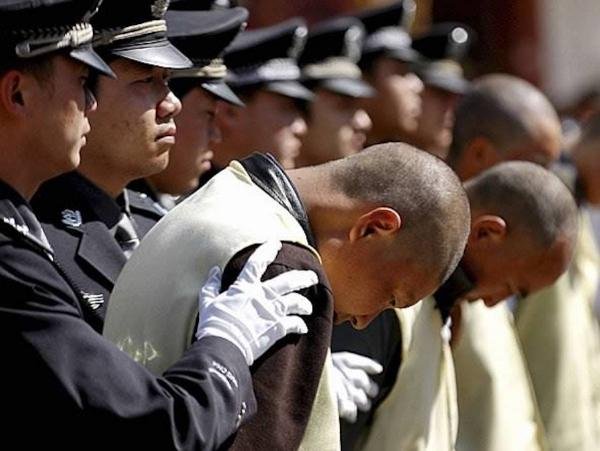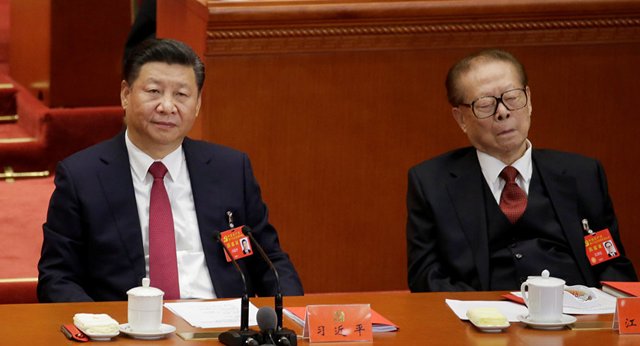"Chinese way" of anti-corruption struggle
It is known that there is no country left untouched by corruption in one way or another. Naturally, it is not just difficult, but very difficult, to deal with such selfish abuses. Especially where the" red envelopes " and other signs of respect and gratitude have become an integral part of the national mentality.
The war on general corruption in China a few decades ago, in fact, replaced only a system of slogans about the high purity of party discipline. Activities was reduced to exemplary punishment of insignificant, and sometimes and simply objectionable officials, or was connected with fight for the power between clans.
In a country with a population approaching 1.5 billion people, efforts have been made to treat this "disease" gradually. By the 90s of the last century, there were specific limits of criminal liability for theft and bribery in especially large size, with well-known executions and harsh life imprisonment. But such measures often differed from the reality of the challenge to society, they were paid attention very selectively.
Later years, the Central Commission on discipline check (which to a greater extent supervised the direction of anti — corruption fight) took a sudden step, confessed voluntarily-expected "leniency". Instead of term, the repented officials were deprived of positions, and remained with a ban to hold leading positions. Over 5 years of this "state action" about 150 thousand bribe-takers returned the receipt of a bribe in the sum more than $ 80 million, repented and retired from the public service.
The main changes began with the coming to power of the current leader of China, XI Jinping. In fact, he violated the centuries-old "compromise" of corrupt elites. Without waiting for the time of departure of high-ranking officials to rest, he got involved in an unprecedented scale fight here and now, despite the previous merits and experience.

In the first year alone, optimizing the costs of traditional party banquets and celebrations, VIP-class tickets, lower demand for luxury goods, etc., China received budget savings of a hundred billion dollars. These are the consequences of the "downturn" of business, closely related to the relatives of officials, transfers to offshore, etc.
Despite the fact that China has an average percentage of officials (less than 8%, in Russia more than 20%), during the anti-corruption campaign of the current leader, about a million corrupt officials were punished. At the same time, less than 1% were sentenced to execution as demonstration lessons for the rest, and public executions are legally prohibited.
Unlike the Russian "experience", corrupt officials are not kept under house arrest, all property is confiscated in China and they are forever deprived of political rights. For receiving illegal income in equivalent approximately 15 thousand dollars, it is provided from 10 years of imprisonment, and in the sum exceeding 500 thousand dollars — the death penalty, with a delay of its execution for several years (which almost always, is replaced with life imprisonment).
Citizens and today consider bribery as one of the most important directions for fight of the Chinese society. For a long time now, there has been a hotline where officials ' abuse can be reported anonymously, with statistics showing that almost half of the investigations were initiated precisely because of public signals.

For notorious "violation of party discipline", similar to the Russian formulation of "loss of trust", only for last year about 160 thousand people were attracted. For comparison, in Russia, less than 2 thousand people were involved in crimes in the public sector. The responsibility lies mainly with the representatives of the underclass, and not with those who allocate funds, and should monitor their intended use.
It should be recognized that the effectiveness of the mobile units (inspection teams) of the Department under the leadership of the closest ally of XI - Wang Qishan is very high. Several times a year they are sent to a variety of institutions and state-owned companies of any level, with incredible discipline and dedication.
The other side of the problem is also Noticeable, only those officials who, one way or another, lose their patronage or become victims of political struggle are punished. Take the loudest cases when potential opponents of the current leader: the Minister of Commerce, the Minister of public security, Deputy Chairman of the military Council and a member of the standing Committee of the Politburo of the Central Committee accused of planning a coup. For corruption and attempted usurpation of power they were sentenced to life imprisonment with confiscation.
Suppress this kind of opponents, historically, a fairly typical action in the political arena. And the "inconvenient" held conservative positions, were followers of former leader Hu Jintao, and probably not all the authorities share the innovations of XI Jinping.

A bright future is even more curious. More than a month ago, at the session of the national people's Congress, it was decided to make XI Jinping "permanent leader", remove the restrictions on the number of terms. The Deputy was elected by Wang Qishan, who for many years led the fight against corruption in China.
On the threshold and serious institutional reform. The number of ministries and agencies will be cut by almost half, which should further strengthen the vertical of power, supervision of the state apparatus. Replaced the three political agencies in the fight against corruption will come a single control Board.
I feel that something even more grandiose, "cleaning" of tops of Communist party under a flag of fight against corruption prepares? Declared a challenge at the regional level, XI Jinping instructed the "super-agency" to put an end to the fight against the triads (all known mafia groups from the depths of centuries).
Based on the domestic realities, each country should choose its own anti-corruption strategy. After all, the same popular in China meditative self-improvement classes, which are held in party schools, or "entertaining excursions" to prisons, where officials and their families are introduced to the reality as a preventive measure — are unlikely to take root in Russia.

Chinese: tricky, corrupted and mafia proned.
You got a 2.80% upvote from @emperorofnaps courtesy of @glex!
Want to promote your posts too? Send 0.05+ SBD or STEEM to @emperorofnaps to receive a share of a full upvote every 2.4 hours...Then go relax and take a nap!
This post has received a 3.91 % upvote from @boomerang.
I was summoned by @glex. I have done their bidding and now I will vanish...
A portion of the proceeds from your bid was used in support of youarehope and tarc.
Abuse Policy
Rules
How to use Sneaky Ninja
How it works
Victim of grumpycat?